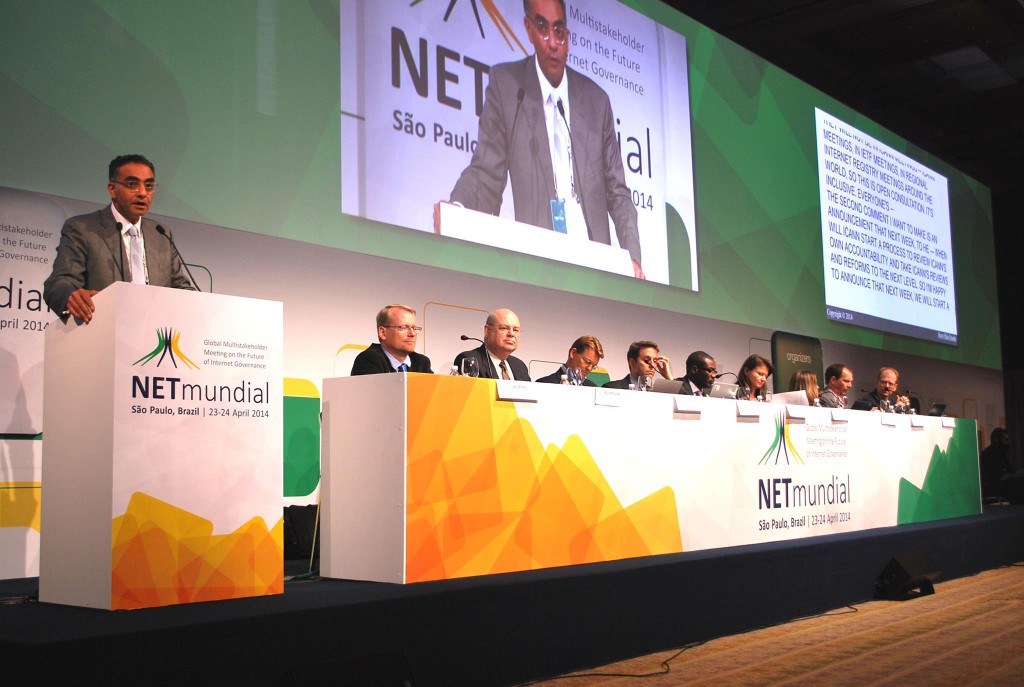Over two days last week in Sao Paulo, the much vaunted and anticipated NETmundial Conference came and went. Leaders from business, government, civil society, academia and other arenas converged to talk about the future of Internet governance. While the conference imbued faith in the multi-stakeholder process, it wrapped up having achieved far less than Brazilian President Dilma Rousseff had hoped for back in October 2013. ICANN CEO Fadi Chehadé seemed satisfied with the outcome document (PDF), stating ‘this is how we’re going to start building an Internet for everyone’. But reports suggest the enthusiasm in the room was muted. While it was certainly an achievement that the ‘high-level’ multi-stakeholder committee managed to cut a path towards ‘rough consensus’ in the outcome document, the emphasis is on ‘rough’. While there was condemnation of the online surveillance activities that spurred the meeting into existence, lobbying and compromise saw issues such as free expression, privacy and net neutrality fall by the wayside. Many who left NETmundial disappointed will now be looking for new ways to progress the multi-stakeholder governance agenda in the future.
The September 2015 deadline for the transition of IANA responsibility from the Department of Commerce to ICANN is an ambitious one and the Sao Paulo conference sought to set the multi-stakeholder community on the path to success. Sadly, efforts for consensus in Net governance have been shown to be at once fraught and dull. For those who hope to enact change in the system, whether fundamental or otherwise, simply wishing that a consensus might yet emerge isn’t a viable option.
If NETmundial proves to be the norm rather than the exception, a long line of inconclusive debates will simply provide fodder for the US vision of ICANN and perhaps even continued Department of Commerce oversight. It’s up to the international community to demonstrate it has the maturity and sensibility to manage the next stage responsibly. The dysfunction of international efforts so far would be reason enough for the US to withhold the keys to the internet management car for a while longer by continuing its role as a symbolic guarantor of internet stability—a move that would be eagerly supported by the business and civil communities that benefit from digital connectivity.
For those groups that might push for a full state sovereignty model, looking to the United Nations or other intergovernmental organisations to take the reins, the US would be widely supported in rejecting the proposal as outside of its stated principles framework. Backers of statist models might point to the Shanghai Cooperation Organization’s International Code of Conduct for Information Security, stating that at least those nations have offered a plan whereas the US and its supporters have not. But this tactic is unproductive and plainly false, the US proposal is the existing system which it moulded itself.
Therefore, the burden falls truly on those pursuing change to offer constructive, concrete policy proposals for governance reform. There’s certainly room for an evolution of ICANN, some space for an increased government role, and plenty of room to internationalise. Key questions include how to balance the interests of more established digital economies, businesses, and civil society groups with those of newer members of the discussion, how to both enhance existing capabilities while expanding reach to often remote areas, and how to approach issues as controversial as net neutrality and as fundamental as gTLD. It’s vital that future internet governance meetings are focused on achieving practical changes and are not distracted by issues like cyber espionage and cybercrime, which are altogether different discussions.
If the international community manages to draft a reasonable and constructive set of reforms, Internet governance will evolve incrementally. Well developed and clear proposals will either be accepted by the US as palatable or will force the Americans to make a diplomatically challenging rejection, returning it to the backfoot in the debate. Ideological grandstanding and diluted statements won’t push the debate forward; the key is concrete proposals on policy and structural reform.
The question of whether or not and to what degree Internet governance should be altered at all is a matter of opinion. But it’s clear that if any change is to be effected, clear and pointed proposals must be levied to press the status quo in a constructive way. The game is far from over. True, the US decision to transfer IANA responsibility has done a lot to reset the debate, but the handover isn’t set in stone. If the global multi-stakeholder community can’t convince the Administration that they have the maturity to take the internet forward through consensus reforms, September 2015 might yet roll right by with nothing changed. Time favours the status quo.
Klée Aiken is an analyst and David Lang is an intern in ASPI’s International Cyber Policy Centre. Image courtesy of NETmundial.


